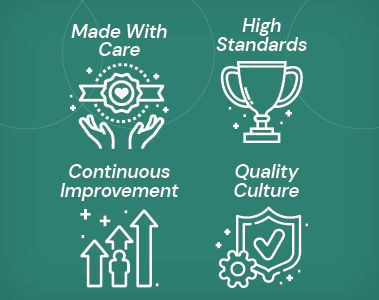
-
North America/EN
- Global
- North America
- Latin America
In an era where customer expectations are higher than ever, organizations must constantly seek ways to improve the quality of their products and services. While quality might have once been seen as a series of final checks before delivery, dsm-firmenich recognizes that quality is an ongoing journey. Continuous improvement in quality processes is not a one-time effort but a perpetual commitment to refining every aspect of an organization’s operations. This approach not only enhances customer satisfaction but also fosters a culture of innovation, efficiency, and excellence.
dsm-firmenich Integrated Continuous Improvement (DICI) refers to an ongoing effort to enhance products, services, and processes incrementally. Rather than focusing on sweeping changes, DICI encourages small, incremental improvements that, over time, can lead to significant advancements through lean six sigma.
Lean six sigma can be divided into two methodologies:
While the benefits of DICI is clear, it’s important to recognize that the journey can present challenges. These may include resistance to change, lack of adequate resources, or difficulty in maintaining momentum. To overcome these challenges, dsm-firmenich fosters a culture of change which encourages a growth mindset and creates an environment where change is seen as an opportunity, not a threat. dsm-firmenich also provides training and resources to equip employees with the tools and knowledge needed to participate in improvement initiatives along with regularly reviewing progress to keep the momentum going.
Continuous improvement in quality processes is essential for dsm-firmenich to thrive in a competitive, fast-paced industry. By focusing on incremental changes, empowering employees, and using data-driven methodologies, dsm-firmenich can achieve greater quality, efficiency, and customer satisfaction. A commitment to continuous improvement not only enhances short-term performance but also lays the foundation for long-term success and sustainability. In this DICI journey, every small step forward leads towards excellence.
21 April 2025
We detected that you are visitng this page from United States. Therefore we are redirecting you to the localized version.